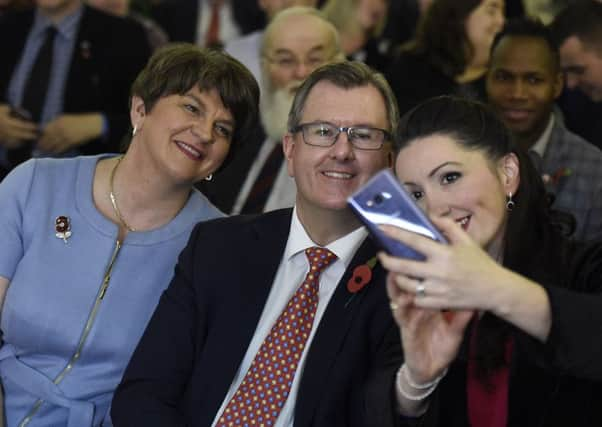Sam McBride: DUP quietly yearning for Stormont after a bruising year


A prime minister propped up by the party has sought to push through a Brexit deal contrary to the party’s “one red line”, with Boris Johnson’s betrayal particularly humiliating because so many people had warned the DUP that it was likely.
Last week saw Northern Ireland move from having the most restrictive abortion regime in the UK to the most permissive. On the same day same-sex marriage was legalised. The DUP has had two mediocre elections. Stormont is no closer to being restored. The Union is under more pressure than at any time in decades. Unionism is isolated within the UK, having been abandoned by those it thought were its allies, while relations with Dublin have soured.
How has this happened?
Advertisement
Hide AdAdvertisement
Hide AdThat question was neither asked nor addressed on Saturday, but that is the nature of modern stage-managed party conferences which are carefully stage-managed to prevent public dissent.
Only the DUP’s most zealous critics could claim that it has been solely responsible for all of the last year’s problems for it. But only Arlene Foster’s most unthinkingly loyal acolytes could honestly say that she and some of her senior colleagues have not brought some of this on themselves.
If the DUP had been modest about its Westminster position of power, it could now point to the unreasonableness of criticising a small regional party for not being able to alter a pan-EU agreement.
Just days after the 2017 general election, the party received frank public advice from a man the DUP – along with Sinn Fein – had less than a year earlier head-hunted to be their first joint spokesman at Stormont.
Advertisement
Hide AdAdvertisement
Hide AdDavid Gordon, the shrewd former Belfast Telegraph political editor, wrote in that newspaper: “There is always a danger in politics of overplaying your hand ... there is a tendency among some in the party to swagger and bluster when things are going their way. They should know by now that doesn’t always end well.”
Although the DUP has members who exhibit humility and grace, much of what the public has seen over the last two years has been swaggering. But as the party’s Westminster influence recedes, on Saturday there was a message of unmistakable relevance: Stormont is of strategic importance to unionism and, implicitly, it is therefore worth compromising in order to secure the return of devolution.
In Nigel Dodds’ words on Saturday, “we must never forget that the interests of unionism and of Northern Ireland are best served when we control our own destiny”.
But while that message had been heard at every DUP conference since Stormont’s fall, it now carries a particular resonance and urgency. The day in which power in London is gone and where a PM over whom the DUP has no control acts in ways which alarm unionism is now much closer than at previous conferences.
Advertisement
Hide AdAdvertisement
Hide AdBut the danger for the DUP is that, having previously shown limited urgency to restore Stormont, the party could now appear too desperate to get devolution back.
The lengthy tracts of Mrs Foster’s speech hinting at a willingness to compromise on the Irish language act were carefully phrased and her words were intended to be conciliatory.
But does she, as the leader who said “I will never accede to an Irish language act”, have the political nous or the authority to pull off a spectacular U-turn if that is deemed necessary?
There was no hint on Saturday that those around Mrs Foster are preparing to push her out in favour of someone who does not have that and other baggage. Mr Dodds is respected across the party’s various wings and will be critical to any move against Mrs Foster. His speech confirmed the widespread belief that he does not want Mrs Foster to be replaced. The North Belfast MP lauded his leader, telling her: “Under your leadership Arlene, this party stands strong as the guardians of our precious Union.”
Advertisement
Hide AdAdvertisement
Hide AdDespite all the calamities which have recently befallen the DUP, a snap election at this point could be electorally less problematic than one next year. The sense of existential threat to the Union – and unionist anger at its betrayal – could significantly insulate the DUP from otherwise damaging disillusionment.
The new UUP leader, Steve Aiken, has not yet even been formally ratified.
And the RHI Inquiry may not report before any December election.
However, set against that is the potential that if an election happens it will be because the prime minister has managed to secure the passage of his deal through Parliament.
Advertisement
Hide AdAdvertisement
Hide AdIf that has happened, a party which has boasted of its influence and as recently as last week voted to sustain this government in office would have another – and perhaps the most significant – entry in its column of losses.